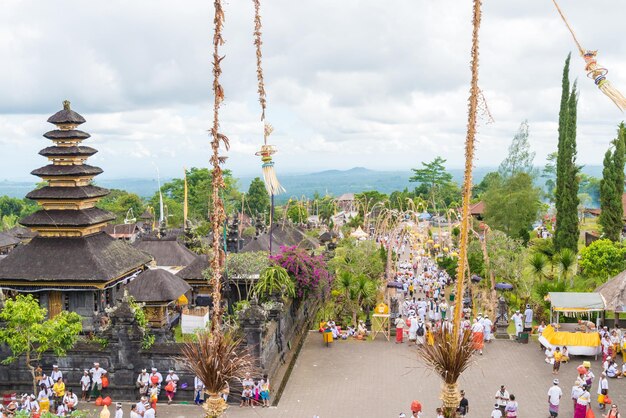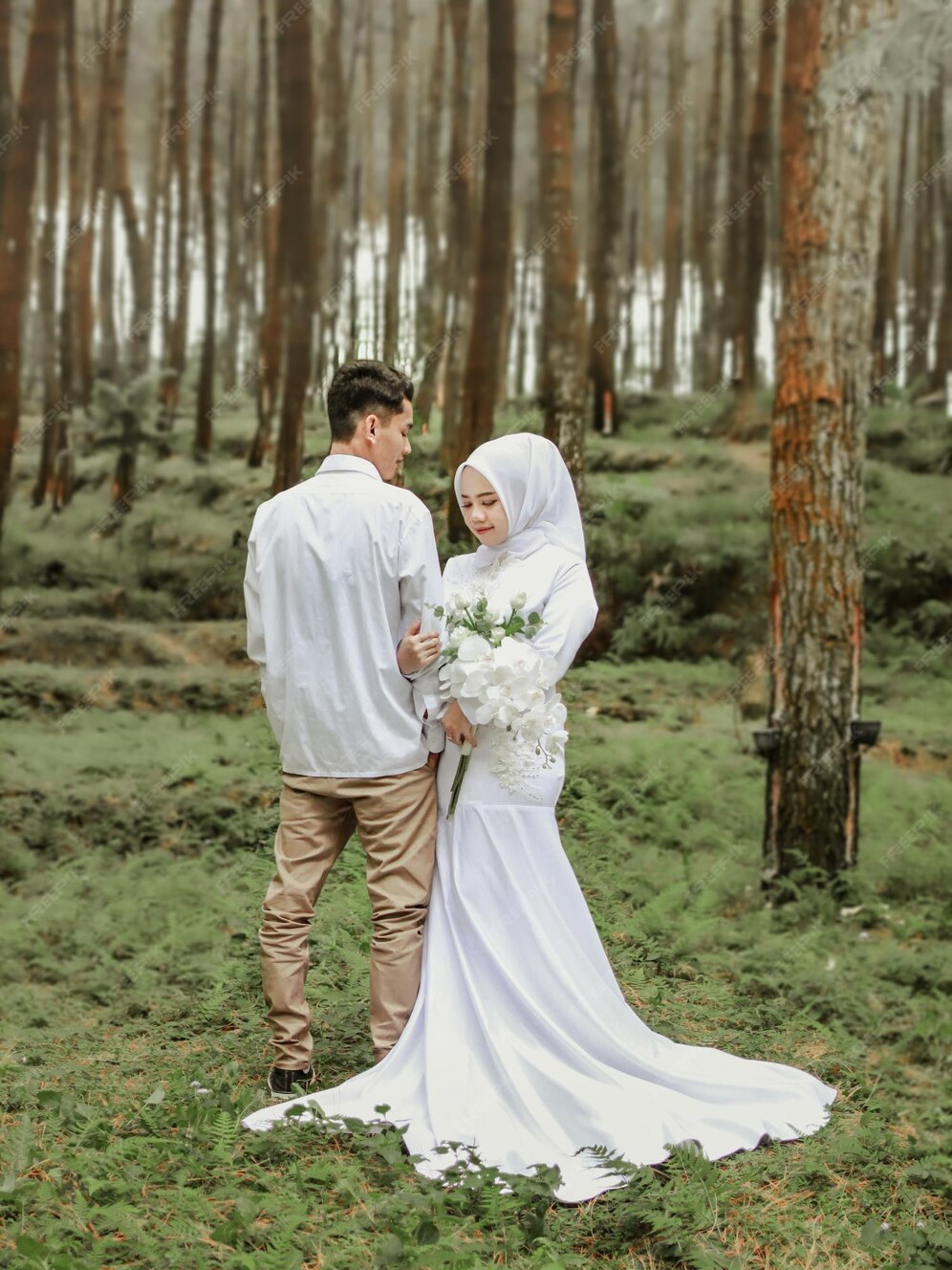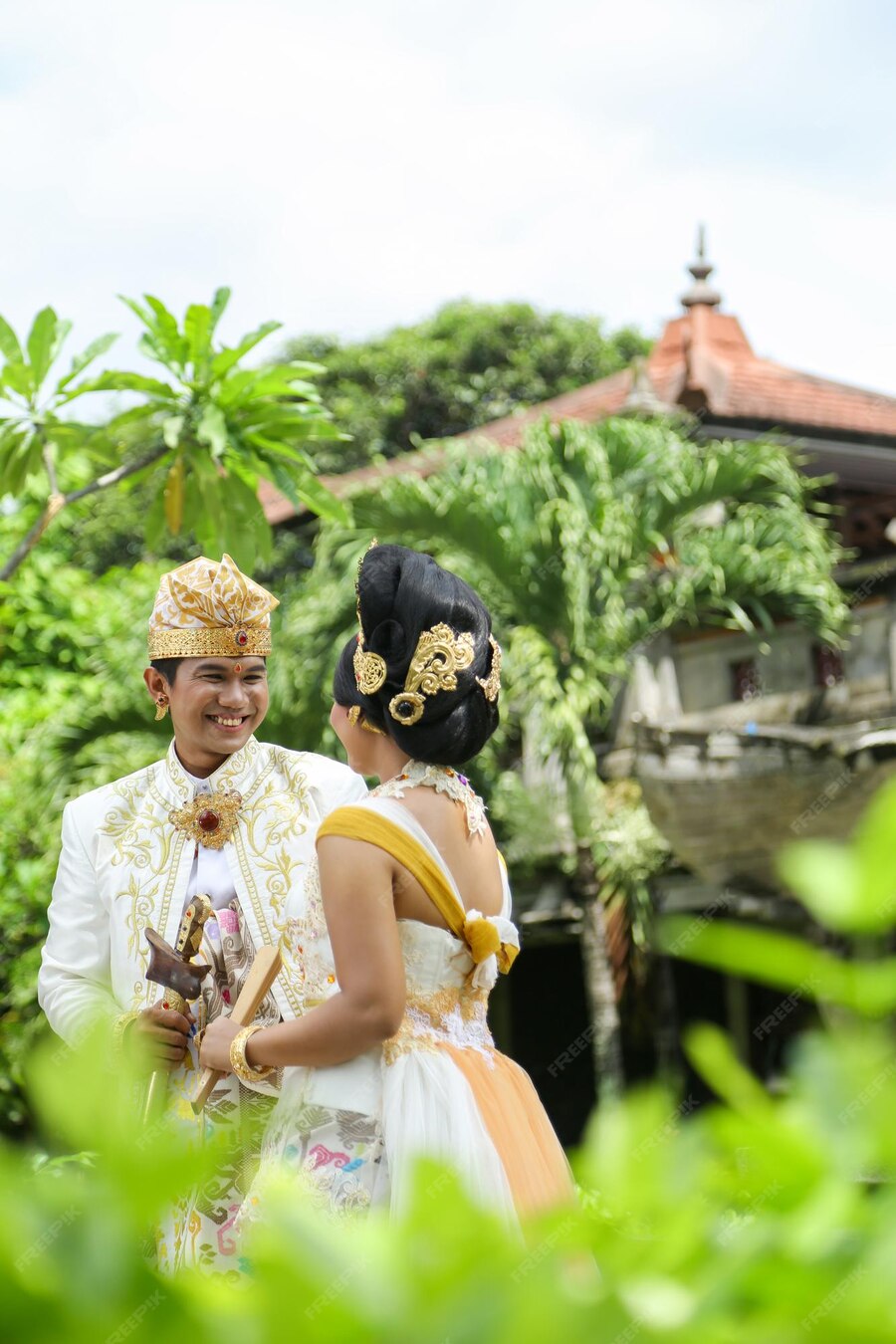Bali - a vibrant melting pot where Indonesian people of different faiths meet, often forming deep connections that culminate in love and marriage.
Yet, Indonesia's marriage
laws, which mandate religious ceremonies and require couples to share the same
faith, pose significant hurdles for inter-faith unions.

This article examines the intricate
dynamics of inter-faith marriages among Bali's residents. Through intimate
personal accounts, it explores the trials and triumphs of couples navigating
the complex terrain of love across religious boundaries, shedding light on the
challenges they face and the resilience they demonstrate in their pursuit of
harmony and mutual understanding.
Ibu Nita
Ibu Nita's story illustrates the complex
relationship between tradition, family dynamics, and religious beliefs. At 70
years of age, she is the matriarch of a large family, guiding them with her
wisdom and experience.
Ibu Nita was born into a Balinese Hindu
family and spent her early years travelling due to her father's military
service in eastern Indonesia. Despite being Hindu, her family's religious
practices became less strict during this time, and she attended a Catholic
school. Remarkably, her time in the Catholic tradition had a lasting impact on
her, as she can easily recite passages from the Bible.
Upon return to Bali, Ibu Nita’s spiritual
journey shifted significantly when she married someone from her Balinese Hindu
community. Renewing her dedication to her ancestral faith, she became a devout
Hindu practitioner. She passed down the teachings of Hinduism to her children
and grandchildren with unwavering commitment.

Yet, the peaceful atmosphere of family
harmony was disturbed when one of Ibu Nita's grandchildren fell in love with a
Muslim woman. The possibility of an inter-faith relationship caused conflict
within the family, especially because the girl's family strongly opposed her
conversion to Hinduism.
In dealing with this sensitive situation,
Ibu Nita faced the entrenched customs of both Balinese and Muslim traditions.
She describes the prevailing societal expectation where the woman is supposed
to abandon her own religious beliefs and adopt her husband's faith, a practice
seen in both Balinese and Muslim cultures.
Determined to preserve her family's Hindu
heritage, Ibu Nita strongly refused to agree to a Muslim wedding ceremony, firmly
standing by the sacredness of their ancestral beliefs. Eventually, the couple
decided to elope, and the young woman embraced Hinduism to solidify her
commitment through Hindu rituals. The subsequent birth of a child played a
crucial role in reconciling with her Muslim family. The divide between the
families slowly healed, opening the door to acceptance and mutual
understanding.
Ibu Nita's story highlights the deep
sacrifices and lasting connections formed through love and faith, providing
insight into the complexities of inter-faith relationships.

Nyoman
Nyoman's story is one of dedication and
tradition. In his early 20s, Nyoman strongly identifies with his Hindu faith,
valuing its rituals and teachings as vital parts of who he is. Growing up in a
family where religion is highly valued, he is committed to passing down the
same respect for religion to his future children, following the example set by
his parents.
Nyoman's life changed when he met his Christian girlfriend during their school days. Despite their differing religious
backgrounds, their love blossomed over the six years of their relationship.
Together, they experienced countless moments of joy and shared laughter,
transcending the barriers imposed by their religious differences. However,
Nyoman's family was initially unsure about his girlfriend because her Christian
faith clashed with their traditional beliefs.
Looking back on how their relationship
has developed, Nyoman recounts stories of his family's initial resistance
gradually turning into acceptance over time. Despite their initial doubts, his
girlfriend has smoothly become a part of their family, joining them on
vacations and winning their hearts with her authentic personality. Nyoman believes
this change happened because his family realised the love and harmony between
them, showing the lasting strength of a genuine connection.

As they navigate the complexities of
their relationship spanning different faiths, Nyoman stresses the significance
of mutual respect and understanding. While he wishes for his girlfriend to one
day embrace Hinduism, he understands the importance of patience. Their journey
towards spiritual unity involves a careful balance of compromise and a strong
commitment to their shared future.
Thinking about what lies ahead, Nyoman
envisions a family grounded in the principles of Hinduism, where their children
inherit the cultural heritage and spiritual wisdom of the religion. For him,
maintaining religious traditions is essential, as it fosters harmony and unity
within their family.
Kadek
Kadek's life story is of tradition, love,
and compromise. A man in his 50s, he spent his childhood in the vibrant culture
of Bali. Despite his deep roots in Balinese Hinduism, Kadek found himself at a
crossroads when he fell in love with a Muslim woman from Java.
Kadek's love for his Javanese girlfriend
faced a clash of religious expectations. Both families insisted on religious
conformity. Kadek's family advocated for his girlfriend's conversion to
Hinduism, while her family demanded his conversion to Islam.
In the end, it was a matter of property
that became the dealbreaker. Her family offered them land and a house, but on
the condition that Kadek embrace Islam. Faced with this ultimatum, Kadek made
the difficult choice to convert, sacrificing his religious identity for the
sake of love and security.

Today, Kadek lives between Java and Bali.
While his wife and children are based in Java, Kadek frequently travels back to
Bali for employment opportunities. In Java, he dutifully attends mosque and
observes religious traditions like Ramadan. However, in Bali, he maintains a
more secular lifestyle, reserving his religious practices for his life in Java,
where adherence to tradition is paramount for community acceptance.
Kadek's story serves as a reminder of the
complexities and sacrifices inherent in inter-faith relationships, where love
often necessitates compromise and adaptation to navigate the intricacies of
cultural and religious expectations.
Andi
Andi's journey from Java to Bali is a
testament to the transformative power of love and the fluidity of religious
identity. Born into Islam, Andi made the bold decision to leave behind his
roots in Java and embark on a new chapter in Bali.
Initially, Andi led a humble life in
Bali, taking on various odd jobs as he navigated the complexities of island
life. However, fate had other plans for him when he crossed paths with Putu, a
dynamic Balinese Hindu woman.
Before their marriage, Andi made the
decision to convert to Hinduism. Reflecting on his transformation, he speaks
with conviction about his newfound sense of belonging in Bali. He describes
feeling at home from the moment he set foot on the island. Embracing Hinduism
was not just a religious conversion for Andi; it was a symbolic affirmation of
his desire to become an integral part of the Balinese society.

Andi, now in his mid-30s, acknowledges
the support of his family in Java: while his decision to convert may have
initially disappointed his parents, they have come to recognize the depth of
his happiness and the strength of his bond with Putu.
For Andi, family and love are the
cornerstones of his identity, transcending religious labels and affirming the
universality of human connection.
Wayan
Wayan's story unfolds in modern-day
Indonesia. In his mid-20s, he faces the challenges of balancing love and faith.
As the eldest son in a Balinese Hindu
family, Wayan represents his parents' hopes and dreams. He graduated from a
prestigious university and now works in information technology in Jakarta,
thriving in the city's fast-paced corporate world. His academic and
professional achievements make him a shining example of his family's bright
future.
During his university years, Wayan met
his girlfriend, who is a practising Muslim. At first, they kept their
relationship hidden from their families because of their different religious
backgrounds. When their relationship was revealed, both families demanded that
the other person convert to their religion for the purpose of marriage.

Wayan sees converting to another religion
as betraying who he is, something he's not willing to do for love. He strongly
believes that they should both keep their own faiths. He imagines a future
where their kids can learn about both Hinduism and Islam and decide their own
beliefs.
Faced with their different religious
backgrounds, Wayan and his girlfriend consider two options: one is to temporarily convert for the wedding ceremony, and the other
is to marry in a non-religious ceremony outside of Indonesia.
Despite their strong commitment to each
other, the shadow of religious disagreement still troubles their relationship,
creating tension within both families. As they try to balance tradition and
modern life, Wayan and his girlfriend show how love can endure through tough
times, demonstrating the resilience of the human spirit.
Tintin
Tintin's narrative is a testament to the strength of love and the power of acceptance in the face of cultural and
religious differences. Raised in the Christian tradition in Sumatra, Tintin,
now in her late 30s, traces her family roots back to China.
Her journey took an unexpected turn when
she ventured to Bali, to pursue higher education. It was there that she met and
fell in love with a Madurese man. Even though they began dating, their journey
to marriage was filled with difficulties, due to their different religious
backgrounds.
In Madura, Islam is dominant, with its conservative beliefs strongly influencing marriage customs that mandate a woman's conversion to Islam. Despite Tintin's family being more liberal, they were opposed to her conversion. With opposition from both families, Tintin
and her partner chose to elope to Singapore, where they could marry without
religious constraints.

Their marriage blends cultures and
faiths, symbolising tolerance and compromise. While Tintin holds firm to her
Christian beliefs, her husband embraces his Islamic heritage. Their children,
raised in both traditions, reflect the harmonious mix of their parents' diverse
backgrounds.
Tintin believes strongly in embracing
diversity and including everyone. She wants her children to have the freedom to
discover their own spiritual beliefs, following what feels right to them.
Despite facing occasional challenges due
to their different religious backgrounds, Tintin and her husband handle their
differences with grace and understanding. Their circle of friends, reflecting
Bali's diverse community, supports their marriage without bias. As they
navigate through the complexities of Indonesian society, Tintin stands as a
symbol of hope for those who choose to challenge norms and embrace love in all
its forms.
Conclusion
Navigating love and marriage across
religious boundaries in Bali demands resilience and adaptability. Despite
facing strict marriage laws, societal norms, and family pressures, these
couples negotiate their relationships with grace and resilience, prioritising
mutual respect and understanding. As Indonesia celebrates its diverse heritage,
these stories powerfully illustrate love's capacity to transcend barriers and
foster unity across cultures and faiths.

You can add one right now!